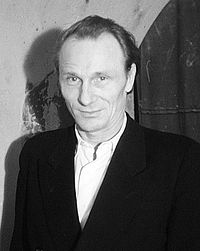Ernst Busch (actor)
| Ernst Busch | |
|---|---|

Ernst Busch, 1946
|
|
| Born |
Friedrich Wilhelm Ernst Busch 22 January 1900 Kiel, German Empire |
| Died | 8 June 1980 (aged 80) Bernburg, East Germany |
| Occupation | singer, actor |
| Awards | Lenin Peace Prize |
Friedrich Wilhelm Ernst Busch (January 22, 1900 – June 8, 1980) was a German singer and actor.
Busch first rose to prominence as an interpreter of political songs, particularly those of Kurt Tucholsky, in the Berlin Kabarett scene of the 1920s. He starred in the original 1928 production of Bertolt Brecht's Threepenny Opera, as well as the subsequent 1931 film by Georg Wilhelm Pabst. He also appeared in the movie Kuhle Wampe.
A lifelong communist, Busch fled Nazi Germany in 1933 with the Gestapo on his heels, eventually settling in the Soviet Union. In 1937 he joined the International Brigades to fight against the Nationalists in Spain. His wartime songs were then recorded and broadcast by Radio Barcelona and Radio Madrid. After the Spanish Republic fell to General Franco, Busch migrated to Belgium where he was interned during the German occupation and later imprisoned in Camp Gurs, France and Berlin. Freed by the Red Army in 1945, he settled in East Berlin, where he acted in the first play to be produced in the American-occupied zone, Robert Ardrey's Thunder Rock. He would go on to start his own record label and work with Bertolt Brecht and Erwin Piscator at the "Berliner Ensemble". A beloved figure in the German Democratic Republic, he is best remembered for his performance in the title role of Brecht's Life of Galileo and his recordings of workers songs, including many written by Hanns Eisler. He also made a memorable recording of Peat Bog Soldiers.
...
Wikipedia
